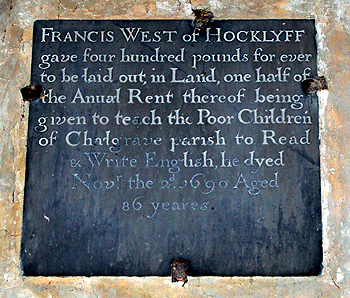Early Education in Hockliffe

Francis West charity plaque in the south aisle at Chalgrave June 2012
Volume 81 published by Bedfordshire Historical Records Society (2002) is a series of episcopal visitations edited by former County Archivist Patricia Bell. At each visitation a list of questions was sent out in advance, one of which enquired about the provision of schools in each parish. In 1706 the vicar of Chalgrave recorded: "Mr. Francis West of Hockliffe by Will dated March 31st 1690 and proved in Doctors' Commons November 10th 1690 left £400 to purchase lands, one halfe of the rent to be given to poor Inhabitants of Chalgrave, the other part to poor Inhabitants of Hockliffe, the better to enable them to set their Children to School to Read and Write. This money is accordingly layd out, and lands purchased with it at Simpson in Bucks, and the rent duly paid by Joseph Cooper and William Grant Trustees". According to the rector of Hockliffe: "There have been given £200 by one Mr West late of this parish for a Master to teach the poor children to read and write. It is left to the disposal of his relations, who have put in one Mr Gould an Anabaptist into that place." At the 1709 visitation it was recorded that Mr. Gould's share of the income from the land purchased with Mr. West's donation was £8 per annum
The appointment of an Anabaptist as schoolmaster caused difficulties in terms of the religious education of his pupils. In 1717 the rector reported that: "An Estate about £8 per annum is given to teach the poor Children of this Parish to read and Write. The number uncertain. The Trustees (not living amongst us) have put in an Anabaptist for Schoolmaster, therefore the children are not taught and instructed according to the doctrine of the Church of England, nor brought to Church as the canon requires". In 1720: "There is a Charity School, whose endowment is the half of the annual rent of £400 worth of Land. The number taught in it is about 20, and as to the Care of instructing them in the principles of the Christian Religion, and bringing them to Church, I suppose it is not great, because the Master is a Dissenter."
In 1818 a Select Committee was established to enquire into educational provision for the poor. This was no doubt prompted, in part, by the recent foundation of two societies promoting education and specifically the building of schools. The Society for Promoting the Lancasterian System for the Education of the Poor was established in 1808 promoting schools run along the lines pioneered by Joseph Lancaster, who had himself copied those of Dr. Andrew Bell, in which older children taught their younger fellows. The Society was renamed the British and Foreign School Society in 1814. It was supported by a number of prominent nonconformists, Lancaster himself was a Quaker, and sought to teach a non-sectarian curriculum. In answer to this perceived nonconformist takeover of local education the National Society was formed in 1811 to encourage the teaching of poor children along Anglican lines, including the catechism. The Select Committee sent a questionnaire to all parishes in the country asking for: particulars relating to endowments for the education of children; other educational institutions; observations of parish needs etc.
The return for Hockliffe and Chalgrave noted that there was: "one small school, endowed by Francis West, with some land in the neighbourhood, producing about £30 per annum, to instruct the children of both parishes; about 16 boys attend … the present schoolmaster never attends the established church, therefore there is no regular Sunday school." In those days a Sunday School was just that, a school which met on a Sunday, usually in the church or nonconformist chapel or other similar building, teaching more than the religious topics with which they are associated today.
In the country generally the number of schools built continued to grow over the next fifteen years so that by 1833 the government agreed to supplement the work of the two societies, and local benefactors, by making £20,000 per annum available in grants to help build schools. It also prompted another questionnaire to be sent to each parish in England asking for details of local educational provision. By the time of this return there had been a significant increase in the schooling available in Hockliffe. There were now four Daily Schools of which three were straw-plait schools "in which 7 boys and 18 girls are instructed at the expense of their parents". The fourth, open to children from both Hockliffe and Chalgrave, contained 45 boys and 5 girls, with 16 of the boys educated by the charity endowment, out of which the master had a salary of £22 and a schoolroom rent free, with the remainder paid by the parents. There were also two Sunday Schools: "one supported by an Independent congregation, wherein are 50 males and 33 females; the other (commenced 1831) of the Established Church, at which are instructed 26 males and 26 females: both these are supported by voluntary contributions".